Inclusion of Life Skill Education in Teacher Education in Bhutan
VerifiedAdded on 2023/01/05
|13
|3373
|1
Report
AI Summary
This report provides an executive summary and detailed analysis of the inclusion of life skill education within teacher education programs in Bhutan. It explores the current curriculum reform efforts, addressing the challenges and issues, particularly the need for practical skills and vocational training to enhance employability. The report emphasizes the importance of adapting the curriculum to align with global trends, focusing on life skills, and inclusive education to meet the diverse needs of students. It also justifies the proposed curriculum changes based on research and the need to improve the quality of teacher education. The report highlights the government's focus on the well-being of citizens and the importance of a comprehensive approach to education that includes life skills to promote student success and economic development.
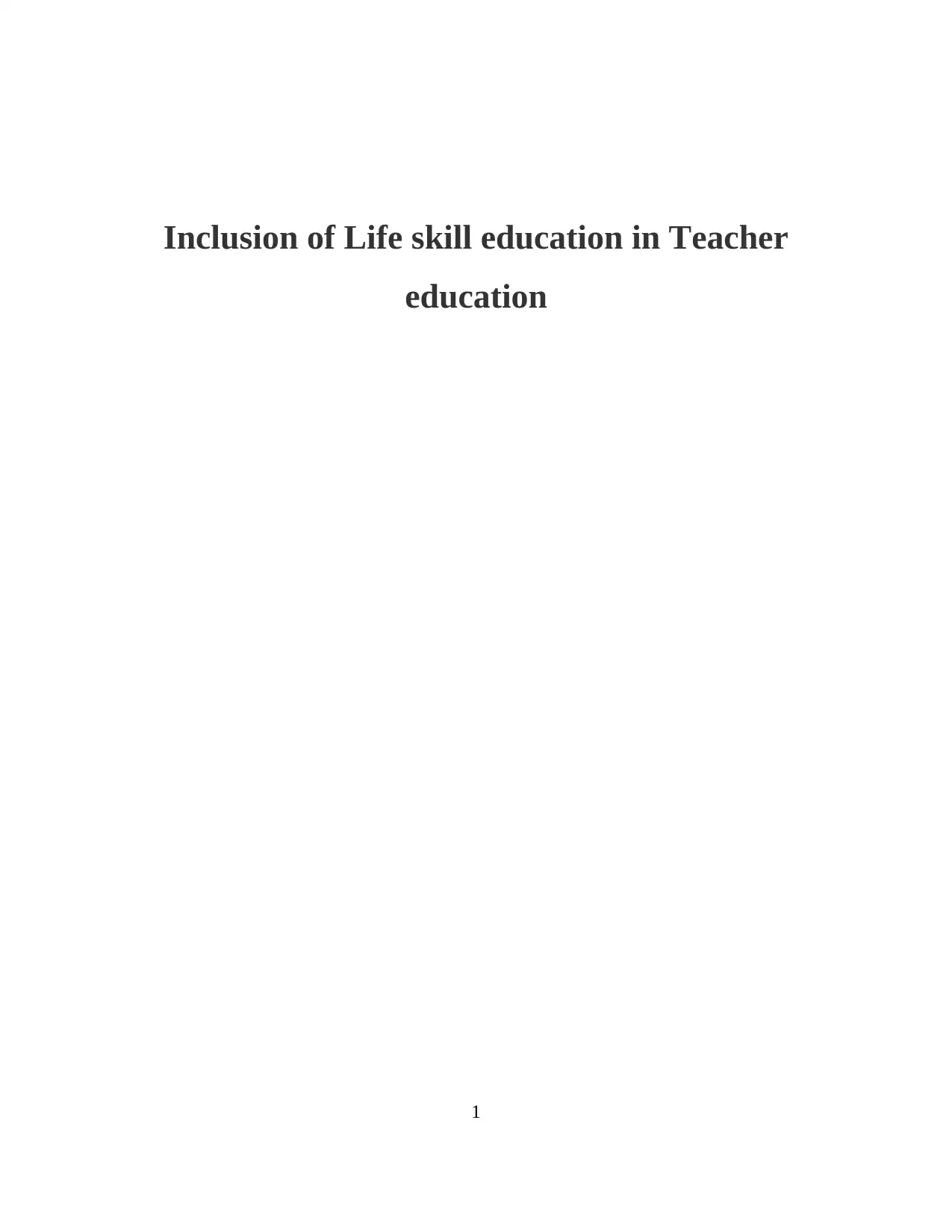
Inclusion of Life skill education in Teacher
education
1
education
1
Paraphrase This Document
Need a fresh take? Get an instant paraphrase of this document with our AI Paraphraser
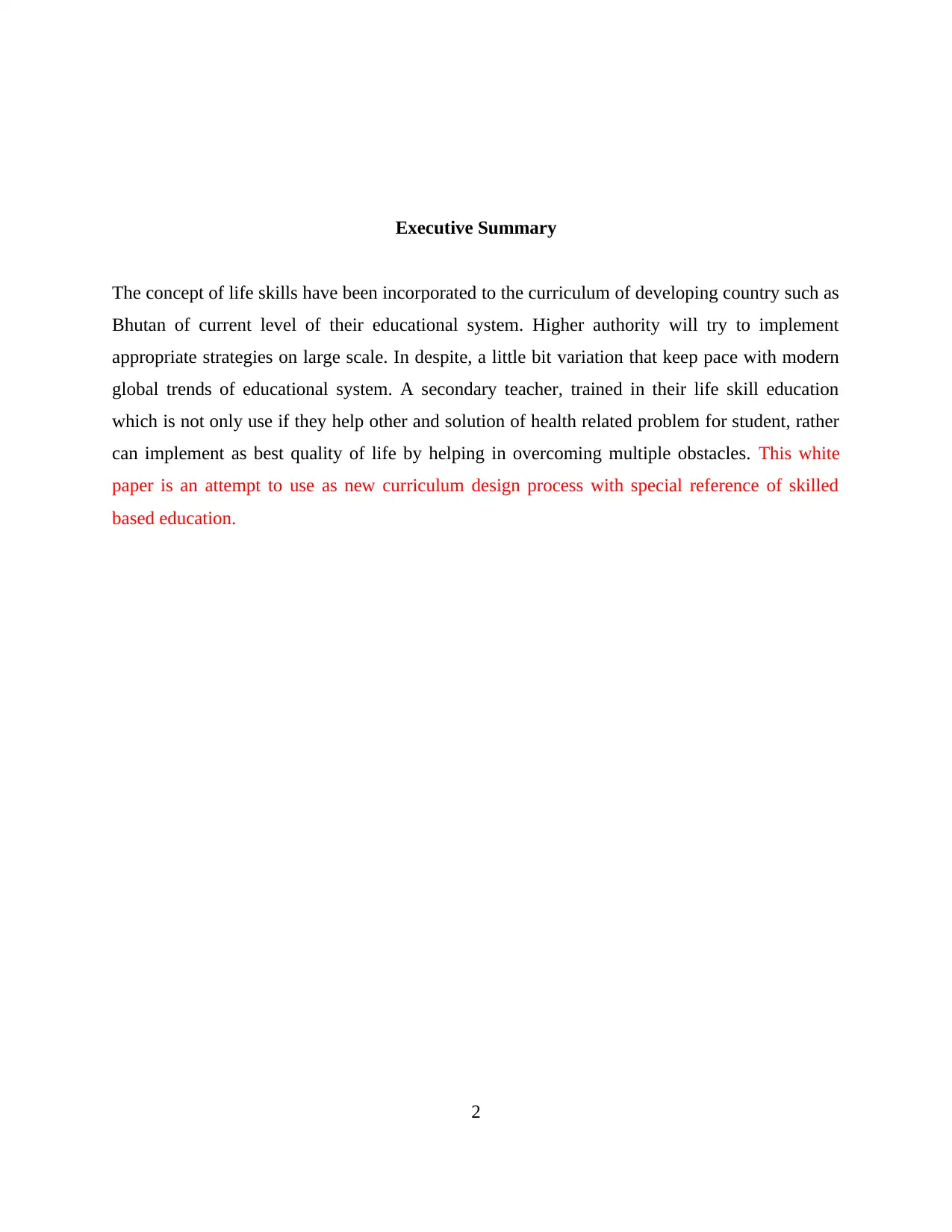
Executive Summary
The concept of life skills have been incorporated to the curriculum of developing country such as
Bhutan of current level of their educational system. Higher authority will try to implement
appropriate strategies on large scale. In despite, a little bit variation that keep pace with modern
global trends of educational system. A secondary teacher, trained in their life skill education
which is not only use if they help other and solution of health related problem for student, rather
can implement as best quality of life by helping in overcoming multiple obstacles. This white
paper is an attempt to use as new curriculum design process with special reference of skilled
based education.
2
The concept of life skills have been incorporated to the curriculum of developing country such as
Bhutan of current level of their educational system. Higher authority will try to implement
appropriate strategies on large scale. In despite, a little bit variation that keep pace with modern
global trends of educational system. A secondary teacher, trained in their life skill education
which is not only use if they help other and solution of health related problem for student, rather
can implement as best quality of life by helping in overcoming multiple obstacles. This white
paper is an attempt to use as new curriculum design process with special reference of skilled
based education.
2
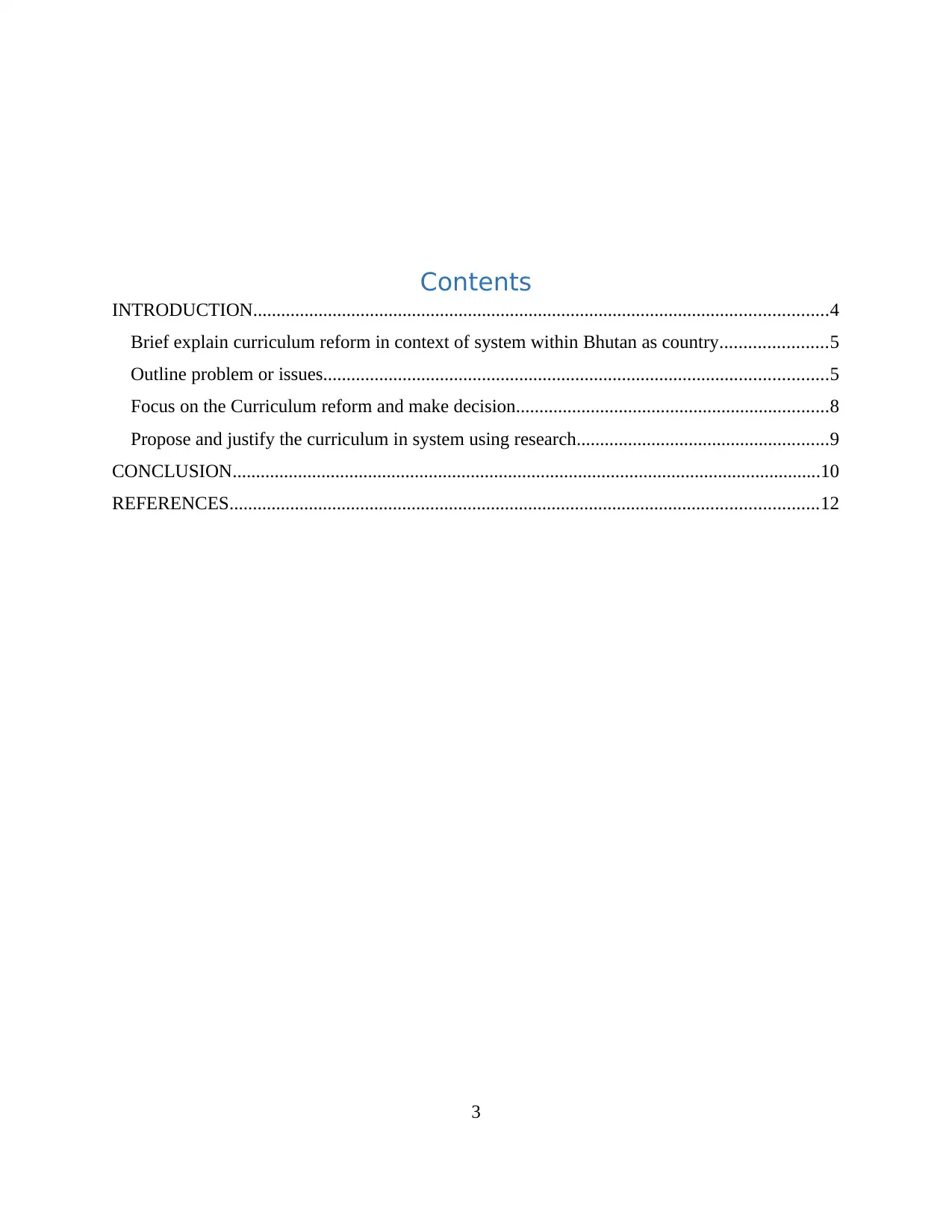
Contents
INTRODUCTION...........................................................................................................................4
Brief explain curriculum reform in context of system within Bhutan as country.......................5
Outline problem or issues............................................................................................................5
Focus on the Curriculum reform and make decision...................................................................8
Propose and justify the curriculum in system using research......................................................9
CONCLUSION..............................................................................................................................10
REFERENCES..............................................................................................................................12
3
INTRODUCTION...........................................................................................................................4
Brief explain curriculum reform in context of system within Bhutan as country.......................5
Outline problem or issues............................................................................................................5
Focus on the Curriculum reform and make decision...................................................................8
Propose and justify the curriculum in system using research......................................................9
CONCLUSION..............................................................................................................................10
REFERENCES..............................................................................................................................12
3
⊘ This is a preview!⊘
Do you want full access?
Subscribe today to unlock all pages.

Trusted by 1+ million students worldwide
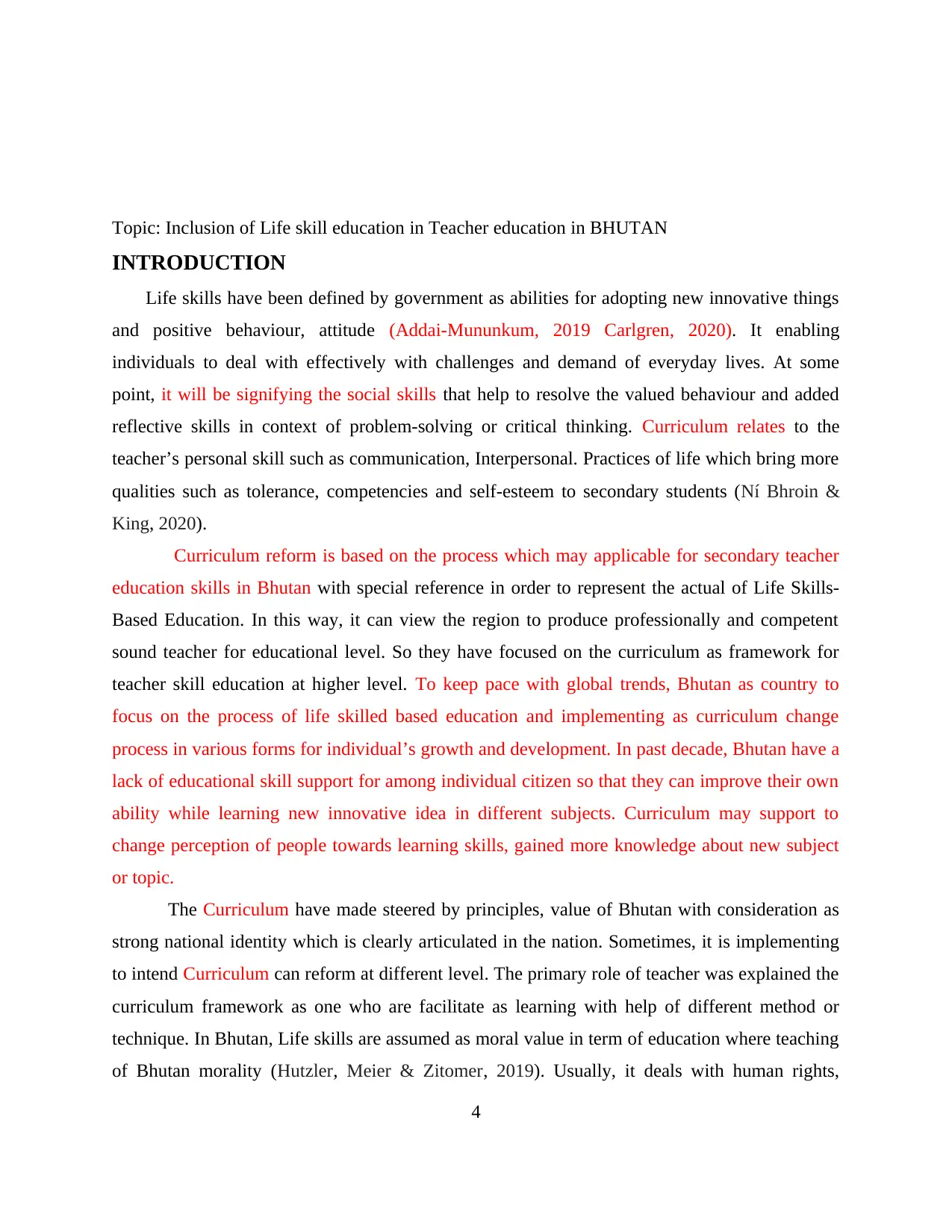
Topic: Inclusion of Life skill education in Teacher education in BHUTAN
INTRODUCTION
Life skills have been defined by government as abilities for adopting new innovative things
and positive behaviour, attitude (Addai-Mununkum, 2019 Carlgren, 2020). It enabling
individuals to deal with effectively with challenges and demand of everyday lives. At some
point, it will be signifying the social skills that help to resolve the valued behaviour and added
reflective skills in context of problem-solving or critical thinking. Curriculum relates to the
teacher’s personal skill such as communication, Interpersonal. Practices of life which bring more
qualities such as tolerance, competencies and self-esteem to secondary students (Ní Bhroin &
King, 2020).
Curriculum reform is based on the process which may applicable for secondary teacher
education skills in Bhutan with special reference in order to represent the actual of Life Skills-
Based Education. In this way, it can view the region to produce professionally and competent
sound teacher for educational level. So they have focused on the curriculum as framework for
teacher skill education at higher level. To keep pace with global trends, Bhutan as country to
focus on the process of life skilled based education and implementing as curriculum change
process in various forms for individual’s growth and development. In past decade, Bhutan have a
lack of educational skill support for among individual citizen so that they can improve their own
ability while learning new innovative idea in different subjects. Curriculum may support to
change perception of people towards learning skills, gained more knowledge about new subject
or topic.
The Curriculum have made steered by principles, value of Bhutan with consideration as
strong national identity which is clearly articulated in the nation. Sometimes, it is implementing
to intend Curriculum can reform at different level. The primary role of teacher was explained the
curriculum framework as one who are facilitate as learning with help of different method or
technique. In Bhutan, Life skills are assumed as moral value in term of education where teaching
of Bhutan morality (Hutzler, Meier & Zitomer, 2019). Usually, it deals with human rights,
4
INTRODUCTION
Life skills have been defined by government as abilities for adopting new innovative things
and positive behaviour, attitude (Addai-Mununkum, 2019 Carlgren, 2020). It enabling
individuals to deal with effectively with challenges and demand of everyday lives. At some
point, it will be signifying the social skills that help to resolve the valued behaviour and added
reflective skills in context of problem-solving or critical thinking. Curriculum relates to the
teacher’s personal skill such as communication, Interpersonal. Practices of life which bring more
qualities such as tolerance, competencies and self-esteem to secondary students (Ní Bhroin &
King, 2020).
Curriculum reform is based on the process which may applicable for secondary teacher
education skills in Bhutan with special reference in order to represent the actual of Life Skills-
Based Education. In this way, it can view the region to produce professionally and competent
sound teacher for educational level. So they have focused on the curriculum as framework for
teacher skill education at higher level. To keep pace with global trends, Bhutan as country to
focus on the process of life skilled based education and implementing as curriculum change
process in various forms for individual’s growth and development. In past decade, Bhutan have a
lack of educational skill support for among individual citizen so that they can improve their own
ability while learning new innovative idea in different subjects. Curriculum may support to
change perception of people towards learning skills, gained more knowledge about new subject
or topic.
The Curriculum have made steered by principles, value of Bhutan with consideration as
strong national identity which is clearly articulated in the nation. Sometimes, it is implementing
to intend Curriculum can reform at different level. The primary role of teacher was explained the
curriculum framework as one who are facilitate as learning with help of different method or
technique. In Bhutan, Life skills are assumed as moral value in term of education where teaching
of Bhutan morality (Hutzler, Meier & Zitomer, 2019). Usually, it deals with human rights,
4
Paraphrase This Document
Need a fresh take? Get an instant paraphrase of this document with our AI Paraphraser
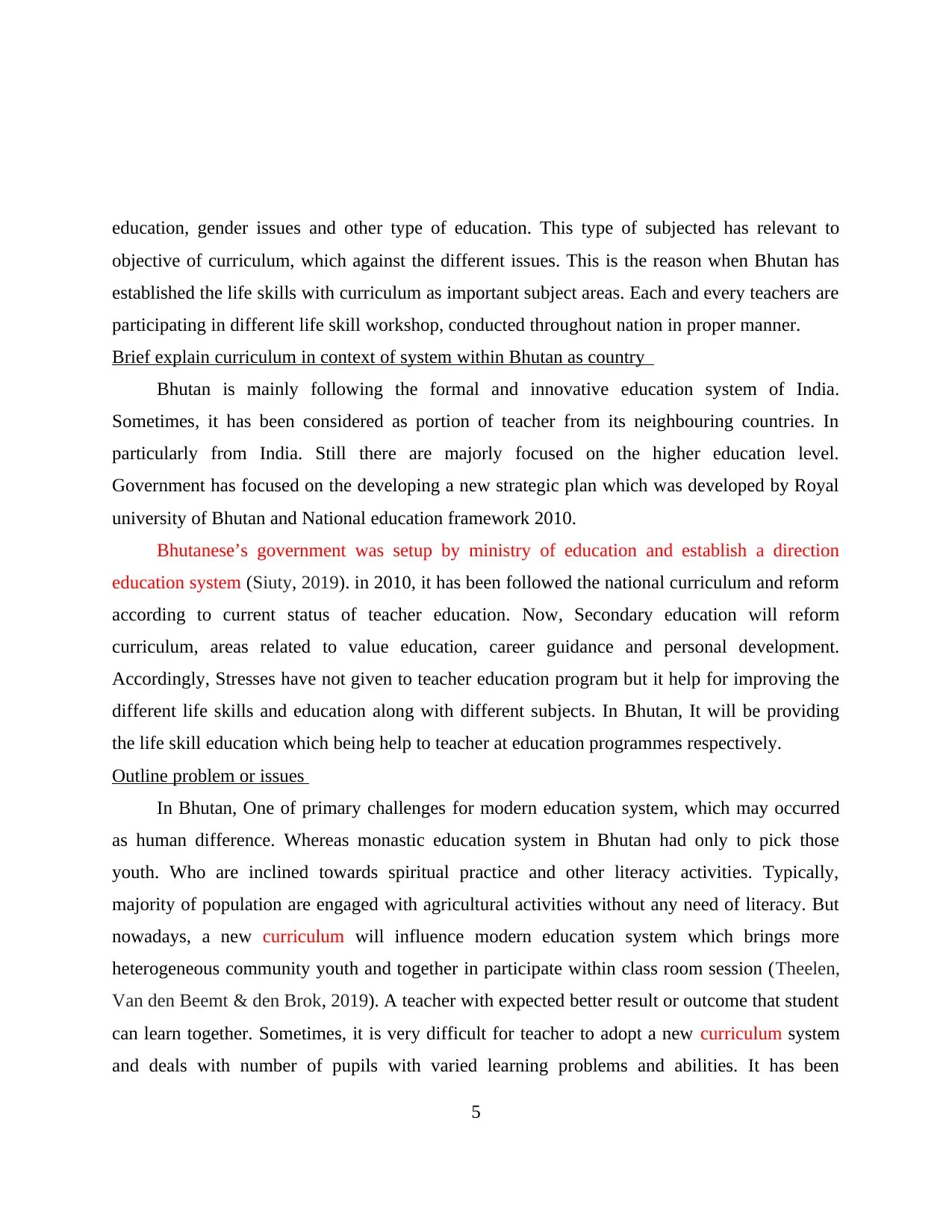
education, gender issues and other type of education. This type of subjected has relevant to
objective of curriculum, which against the different issues. This is the reason when Bhutan has
established the life skills with curriculum as important subject areas. Each and every teachers are
participating in different life skill workshop, conducted throughout nation in proper manner.
Brief explain curriculum in context of system within Bhutan as country
Bhutan is mainly following the formal and innovative education system of India.
Sometimes, it has been considered as portion of teacher from its neighbouring countries. In
particularly from India. Still there are majorly focused on the higher education level.
Government has focused on the developing a new strategic plan which was developed by Royal
university of Bhutan and National education framework 2010.
Bhutanese’s government was setup by ministry of education and establish a direction
education system (Siuty, 2019). in 2010, it has been followed the national curriculum and reform
according to current status of teacher education. Now, Secondary education will reform
curriculum, areas related to value education, career guidance and personal development.
Accordingly, Stresses have not given to teacher education program but it help for improving the
different life skills and education along with different subjects. In Bhutan, It will be providing
the life skill education which being help to teacher at education programmes respectively.
Outline problem or issues
In Bhutan, One of primary challenges for modern education system, which may occurred
as human difference. Whereas monastic education system in Bhutan had only to pick those
youth. Who are inclined towards spiritual practice and other literacy activities. Typically,
majority of population are engaged with agricultural activities without any need of literacy. But
nowadays, a new curriculum will influence modern education system which brings more
heterogeneous community youth and together in participate within class room session (Theelen,
Van den Beemt & den Brok, 2019). A teacher with expected better result or outcome that student
can learn together. Sometimes, it is very difficult for teacher to adopt a new curriculum system
and deals with number of pupils with varied learning problems and abilities. It has been
5
objective of curriculum, which against the different issues. This is the reason when Bhutan has
established the life skills with curriculum as important subject areas. Each and every teachers are
participating in different life skill workshop, conducted throughout nation in proper manner.
Brief explain curriculum in context of system within Bhutan as country
Bhutan is mainly following the formal and innovative education system of India.
Sometimes, it has been considered as portion of teacher from its neighbouring countries. In
particularly from India. Still there are majorly focused on the higher education level.
Government has focused on the developing a new strategic plan which was developed by Royal
university of Bhutan and National education framework 2010.
Bhutanese’s government was setup by ministry of education and establish a direction
education system (Siuty, 2019). in 2010, it has been followed the national curriculum and reform
according to current status of teacher education. Now, Secondary education will reform
curriculum, areas related to value education, career guidance and personal development.
Accordingly, Stresses have not given to teacher education program but it help for improving the
different life skills and education along with different subjects. In Bhutan, It will be providing
the life skill education which being help to teacher at education programmes respectively.
Outline problem or issues
In Bhutan, One of primary challenges for modern education system, which may occurred
as human difference. Whereas monastic education system in Bhutan had only to pick those
youth. Who are inclined towards spiritual practice and other literacy activities. Typically,
majority of population are engaged with agricultural activities without any need of literacy. But
nowadays, a new curriculum will influence modern education system which brings more
heterogeneous community youth and together in participate within class room session (Theelen,
Van den Beemt & den Brok, 2019). A teacher with expected better result or outcome that student
can learn together. Sometimes, it is very difficult for teacher to adopt a new curriculum system
and deals with number of pupils with varied learning problems and abilities. It has been
5
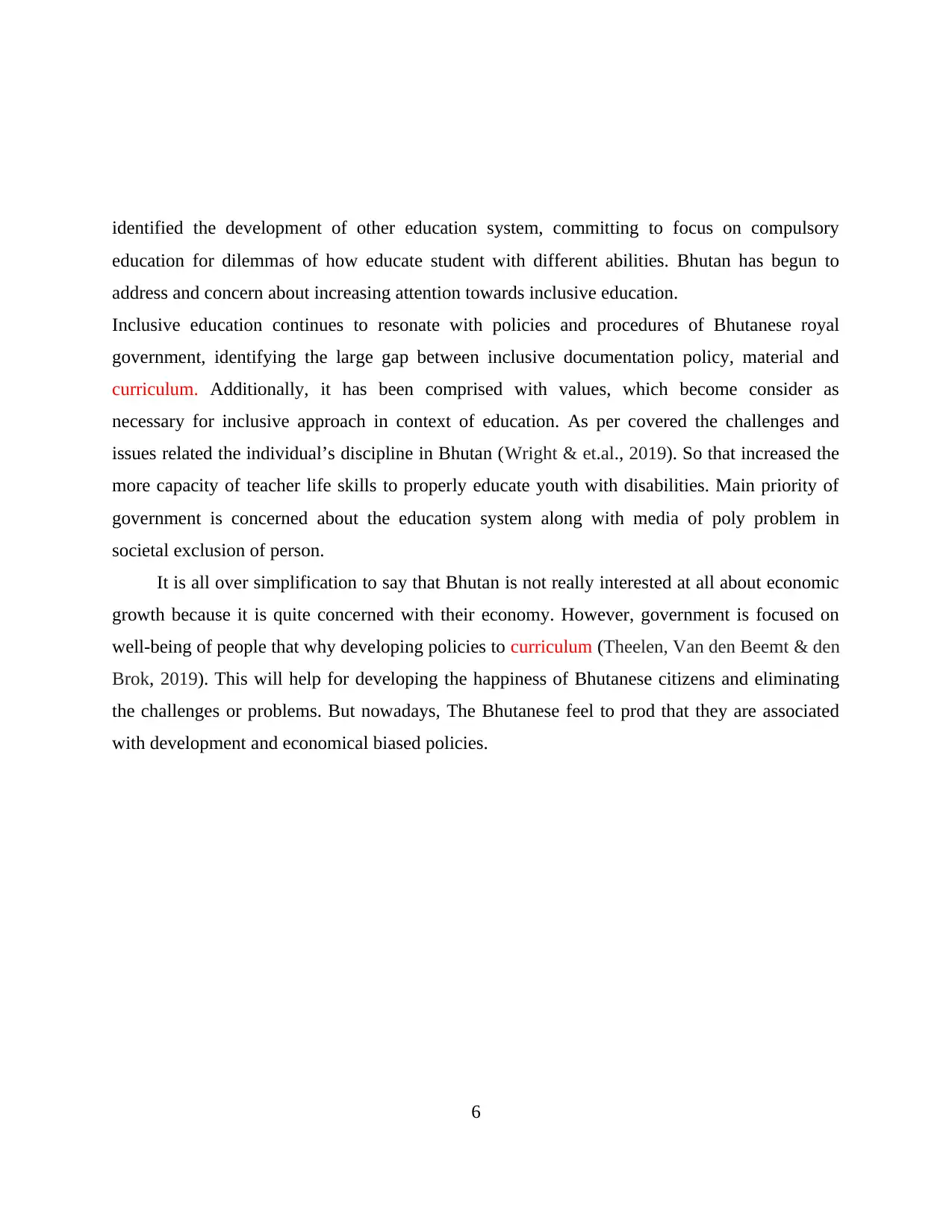
identified the development of other education system, committing to focus on compulsory
education for dilemmas of how educate student with different abilities. Bhutan has begun to
address and concern about increasing attention towards inclusive education.
Inclusive education continues to resonate with policies and procedures of Bhutanese royal
government, identifying the large gap between inclusive documentation policy, material and
curriculum. Additionally, it has been comprised with values, which become consider as
necessary for inclusive approach in context of education. As per covered the challenges and
issues related the individual’s discipline in Bhutan (Wright & et.al., 2019). So that increased the
more capacity of teacher life skills to properly educate youth with disabilities. Main priority of
government is concerned about the education system along with media of poly problem in
societal exclusion of person.
It is all over simplification to say that Bhutan is not really interested at all about economic
growth because it is quite concerned with their economy. However, government is focused on
well-being of people that why developing policies to curriculum (Theelen, Van den Beemt & den
Brok, 2019). This will help for developing the happiness of Bhutanese citizens and eliminating
the challenges or problems. But nowadays, The Bhutanese feel to prod that they are associated
with development and economical biased policies.
6
education for dilemmas of how educate student with different abilities. Bhutan has begun to
address and concern about increasing attention towards inclusive education.
Inclusive education continues to resonate with policies and procedures of Bhutanese royal
government, identifying the large gap between inclusive documentation policy, material and
curriculum. Additionally, it has been comprised with values, which become consider as
necessary for inclusive approach in context of education. As per covered the challenges and
issues related the individual’s discipline in Bhutan (Wright & et.al., 2019). So that increased the
more capacity of teacher life skills to properly educate youth with disabilities. Main priority of
government is concerned about the education system along with media of poly problem in
societal exclusion of person.
It is all over simplification to say that Bhutan is not really interested at all about economic
growth because it is quite concerned with their economy. However, government is focused on
well-being of people that why developing policies to curriculum (Theelen, Van den Beemt & den
Brok, 2019). This will help for developing the happiness of Bhutanese citizens and eliminating
the challenges or problems. But nowadays, The Bhutanese feel to prod that they are associated
with development and economical biased policies.
6
⊘ This is a preview!⊘
Do you want full access?
Subscribe today to unlock all pages.

Trusted by 1+ million students worldwide
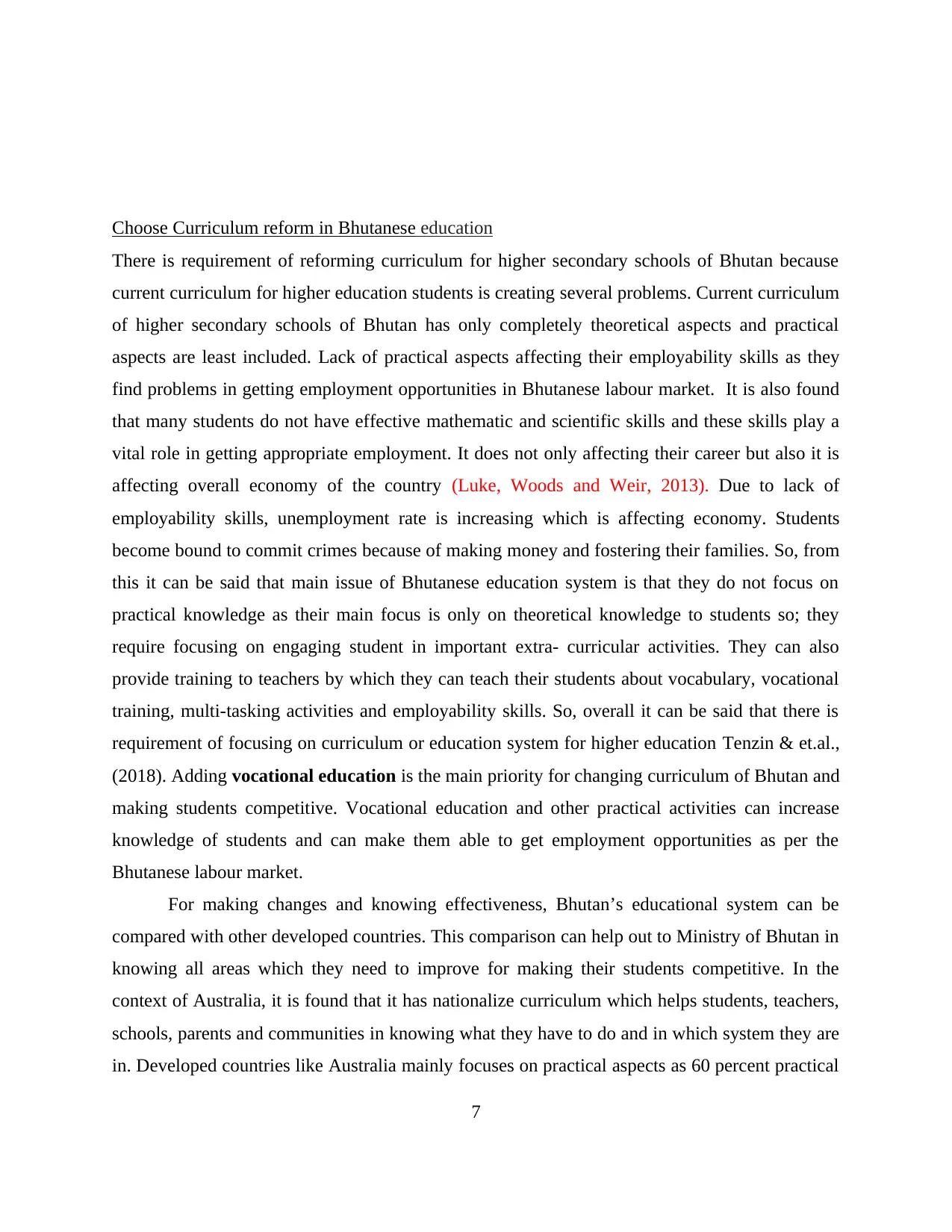
Choose Curriculum reform in Bhutanese education
There is requirement of reforming curriculum for higher secondary schools of Bhutan because
current curriculum for higher education students is creating several problems. Current curriculum
of higher secondary schools of Bhutan has only completely theoretical aspects and practical
aspects are least included. Lack of practical aspects affecting their employability skills as they
find problems in getting employment opportunities in Bhutanese labour market. It is also found
that many students do not have effective mathematic and scientific skills and these skills play a
vital role in getting appropriate employment. It does not only affecting their career but also it is
affecting overall economy of the country (Luke, Woods and Weir, 2013). Due to lack of
employability skills, unemployment rate is increasing which is affecting economy. Students
become bound to commit crimes because of making money and fostering their families. So, from
this it can be said that main issue of Bhutanese education system is that they do not focus on
practical knowledge as their main focus is only on theoretical knowledge to students so; they
require focusing on engaging student in important extra- curricular activities. They can also
provide training to teachers by which they can teach their students about vocabulary, vocational
training, multi-tasking activities and employability skills. So, overall it can be said that there is
requirement of focusing on curriculum or education system for higher education Tenzin & et.al.,
(2018). Adding vocational education is the main priority for changing curriculum of Bhutan and
making students competitive. Vocational education and other practical activities can increase
knowledge of students and can make them able to get employment opportunities as per the
Bhutanese labour market.
For making changes and knowing effectiveness, Bhutan’s educational system can be
compared with other developed countries. This comparison can help out to Ministry of Bhutan in
knowing all areas which they need to improve for making their students competitive. In the
context of Australia, it is found that it has nationalize curriculum which helps students, teachers,
schools, parents and communities in knowing what they have to do and in which system they are
in. Developed countries like Australia mainly focuses on practical aspects as 60 percent practical
7
There is requirement of reforming curriculum for higher secondary schools of Bhutan because
current curriculum for higher education students is creating several problems. Current curriculum
of higher secondary schools of Bhutan has only completely theoretical aspects and practical
aspects are least included. Lack of practical aspects affecting their employability skills as they
find problems in getting employment opportunities in Bhutanese labour market. It is also found
that many students do not have effective mathematic and scientific skills and these skills play a
vital role in getting appropriate employment. It does not only affecting their career but also it is
affecting overall economy of the country (Luke, Woods and Weir, 2013). Due to lack of
employability skills, unemployment rate is increasing which is affecting economy. Students
become bound to commit crimes because of making money and fostering their families. So, from
this it can be said that main issue of Bhutanese education system is that they do not focus on
practical knowledge as their main focus is only on theoretical knowledge to students so; they
require focusing on engaging student in important extra- curricular activities. They can also
provide training to teachers by which they can teach their students about vocabulary, vocational
training, multi-tasking activities and employability skills. So, overall it can be said that there is
requirement of focusing on curriculum or education system for higher education Tenzin & et.al.,
(2018). Adding vocational education is the main priority for changing curriculum of Bhutan and
making students competitive. Vocational education and other practical activities can increase
knowledge of students and can make them able to get employment opportunities as per the
Bhutanese labour market.
For making changes and knowing effectiveness, Bhutan’s educational system can be
compared with other developed countries. This comparison can help out to Ministry of Bhutan in
knowing all areas which they need to improve for making their students competitive. In the
context of Australia, it is found that it has nationalize curriculum which helps students, teachers,
schools, parents and communities in knowing what they have to do and in which system they are
in. Developed countries like Australia mainly focuses on practical aspects as 60 percent practical
7
Paraphrase This Document
Need a fresh take? Get an instant paraphrase of this document with our AI Paraphraser
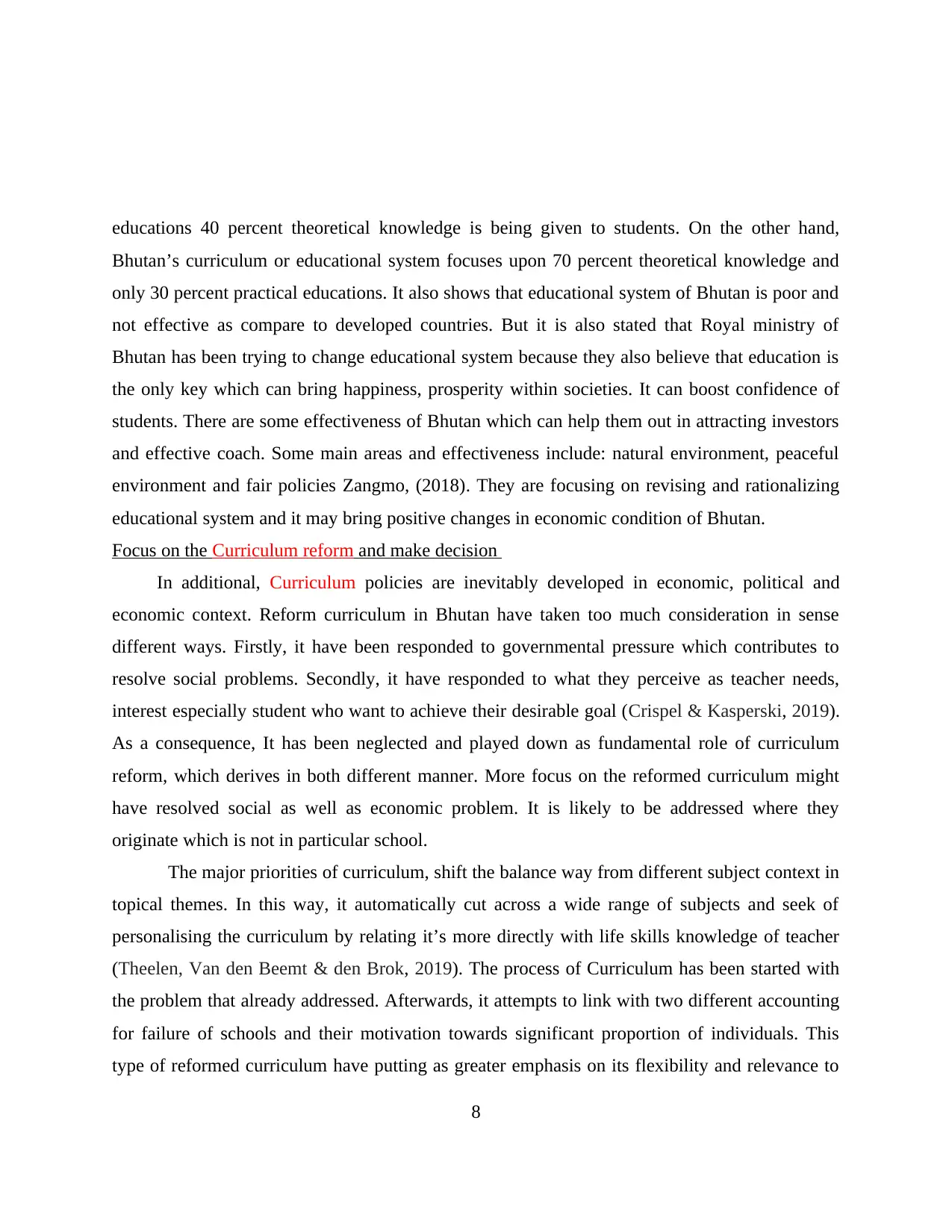
educations 40 percent theoretical knowledge is being given to students. On the other hand,
Bhutan’s curriculum or educational system focuses upon 70 percent theoretical knowledge and
only 30 percent practical educations. It also shows that educational system of Bhutan is poor and
not effective as compare to developed countries. But it is also stated that Royal ministry of
Bhutan has been trying to change educational system because they also believe that education is
the only key which can bring happiness, prosperity within societies. It can boost confidence of
students. There are some effectiveness of Bhutan which can help them out in attracting investors
and effective coach. Some main areas and effectiveness include: natural environment, peaceful
environment and fair policies Zangmo, (2018). They are focusing on revising and rationalizing
educational system and it may bring positive changes in economic condition of Bhutan.
Focus on the Curriculum reform and make decision
In additional, Curriculum policies are inevitably developed in economic, political and
economic context. Reform curriculum in Bhutan have taken too much consideration in sense
different ways. Firstly, it have been responded to governmental pressure which contributes to
resolve social problems. Secondly, it have responded to what they perceive as teacher needs,
interest especially student who want to achieve their desirable goal (Crispel & Kasperski, 2019).
As a consequence, It has been neglected and played down as fundamental role of curriculum
reform, which derives in both different manner. More focus on the reformed curriculum might
have resolved social as well as economic problem. It is likely to be addressed where they
originate which is not in particular school.
The major priorities of curriculum, shift the balance way from different subject context in
topical themes. In this way, it automatically cut across a wide range of subjects and seek of
personalising the curriculum by relating it’s more directly with life skills knowledge of teacher
(Theelen, Van den Beemt & den Brok, 2019). The process of Curriculum has been started with
the problem that already addressed. Afterwards, it attempts to link with two different accounting
for failure of schools and their motivation towards significant proportion of individuals. This
type of reformed curriculum have putting as greater emphasis on its flexibility and relevance to
8
Bhutan’s curriculum or educational system focuses upon 70 percent theoretical knowledge and
only 30 percent practical educations. It also shows that educational system of Bhutan is poor and
not effective as compare to developed countries. But it is also stated that Royal ministry of
Bhutan has been trying to change educational system because they also believe that education is
the only key which can bring happiness, prosperity within societies. It can boost confidence of
students. There are some effectiveness of Bhutan which can help them out in attracting investors
and effective coach. Some main areas and effectiveness include: natural environment, peaceful
environment and fair policies Zangmo, (2018). They are focusing on revising and rationalizing
educational system and it may bring positive changes in economic condition of Bhutan.
Focus on the Curriculum reform and make decision
In additional, Curriculum policies are inevitably developed in economic, political and
economic context. Reform curriculum in Bhutan have taken too much consideration in sense
different ways. Firstly, it have been responded to governmental pressure which contributes to
resolve social problems. Secondly, it have responded to what they perceive as teacher needs,
interest especially student who want to achieve their desirable goal (Crispel & Kasperski, 2019).
As a consequence, It has been neglected and played down as fundamental role of curriculum
reform, which derives in both different manner. More focus on the reformed curriculum might
have resolved social as well as economic problem. It is likely to be addressed where they
originate which is not in particular school.
The major priorities of curriculum, shift the balance way from different subject context in
topical themes. In this way, it automatically cut across a wide range of subjects and seek of
personalising the curriculum by relating it’s more directly with life skills knowledge of teacher
(Theelen, Van den Beemt & den Brok, 2019). The process of Curriculum has been started with
the problem that already addressed. Afterwards, it attempts to link with two different accounting
for failure of schools and their motivation towards significant proportion of individuals. This
type of reformed curriculum have putting as greater emphasis on its flexibility and relevance to
8
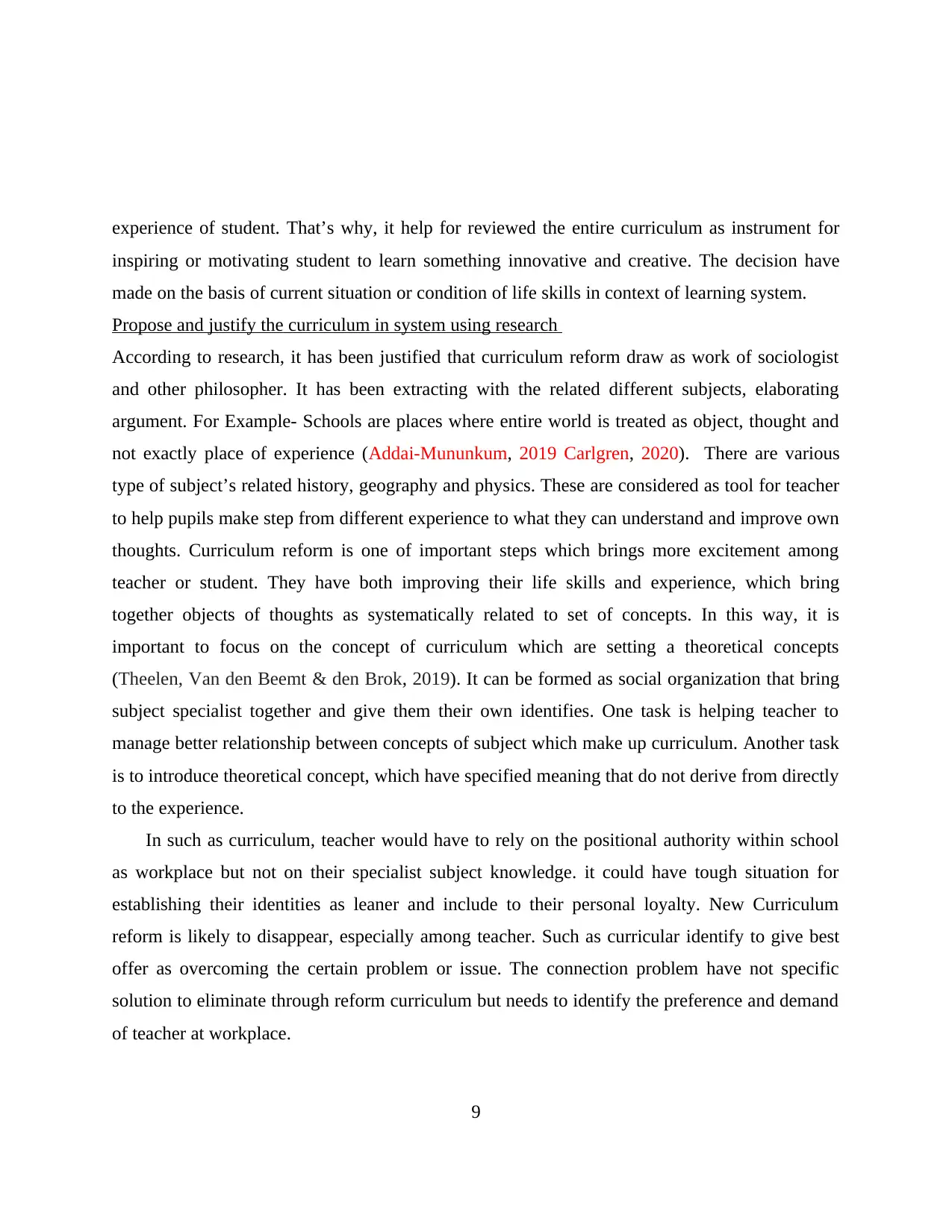
experience of student. That’s why, it help for reviewed the entire curriculum as instrument for
inspiring or motivating student to learn something innovative and creative. The decision have
made on the basis of current situation or condition of life skills in context of learning system.
Propose and justify the curriculum in system using research
According to research, it has been justified that curriculum reform draw as work of sociologist
and other philosopher. It has been extracting with the related different subjects, elaborating
argument. For Example- Schools are places where entire world is treated as object, thought and
not exactly place of experience (Addai-Mununkum, 2019 Carlgren, 2020). There are various
type of subject’s related history, geography and physics. These are considered as tool for teacher
to help pupils make step from different experience to what they can understand and improve own
thoughts. Curriculum reform is one of important steps which brings more excitement among
teacher or student. They have both improving their life skills and experience, which bring
together objects of thoughts as systematically related to set of concepts. In this way, it is
important to focus on the concept of curriculum which are setting a theoretical concepts
(Theelen, Van den Beemt & den Brok, 2019). It can be formed as social organization that bring
subject specialist together and give them their own identifies. One task is helping teacher to
manage better relationship between concepts of subject which make up curriculum. Another task
is to introduce theoretical concept, which have specified meaning that do not derive from directly
to the experience.
In such as curriculum, teacher would have to rely on the positional authority within school
as workplace but not on their specialist subject knowledge. it could have tough situation for
establishing their identities as leaner and include to their personal loyalty. New Curriculum
reform is likely to disappear, especially among teacher. Such as curricular identify to give best
offer as overcoming the certain problem or issue. The connection problem have not specific
solution to eliminate through reform curriculum but needs to identify the preference and demand
of teacher at workplace.
9
inspiring or motivating student to learn something innovative and creative. The decision have
made on the basis of current situation or condition of life skills in context of learning system.
Propose and justify the curriculum in system using research
According to research, it has been justified that curriculum reform draw as work of sociologist
and other philosopher. It has been extracting with the related different subjects, elaborating
argument. For Example- Schools are places where entire world is treated as object, thought and
not exactly place of experience (Addai-Mununkum, 2019 Carlgren, 2020). There are various
type of subject’s related history, geography and physics. These are considered as tool for teacher
to help pupils make step from different experience to what they can understand and improve own
thoughts. Curriculum reform is one of important steps which brings more excitement among
teacher or student. They have both improving their life skills and experience, which bring
together objects of thoughts as systematically related to set of concepts. In this way, it is
important to focus on the concept of curriculum which are setting a theoretical concepts
(Theelen, Van den Beemt & den Brok, 2019). It can be formed as social organization that bring
subject specialist together and give them their own identifies. One task is helping teacher to
manage better relationship between concepts of subject which make up curriculum. Another task
is to introduce theoretical concept, which have specified meaning that do not derive from directly
to the experience.
In such as curriculum, teacher would have to rely on the positional authority within school
as workplace but not on their specialist subject knowledge. it could have tough situation for
establishing their identities as leaner and include to their personal loyalty. New Curriculum
reform is likely to disappear, especially among teacher. Such as curricular identify to give best
offer as overcoming the certain problem or issue. The connection problem have not specific
solution to eliminate through reform curriculum but needs to identify the preference and demand
of teacher at workplace.
9
⊘ This is a preview!⊘
Do you want full access?
Subscribe today to unlock all pages.

Trusted by 1+ million students worldwide
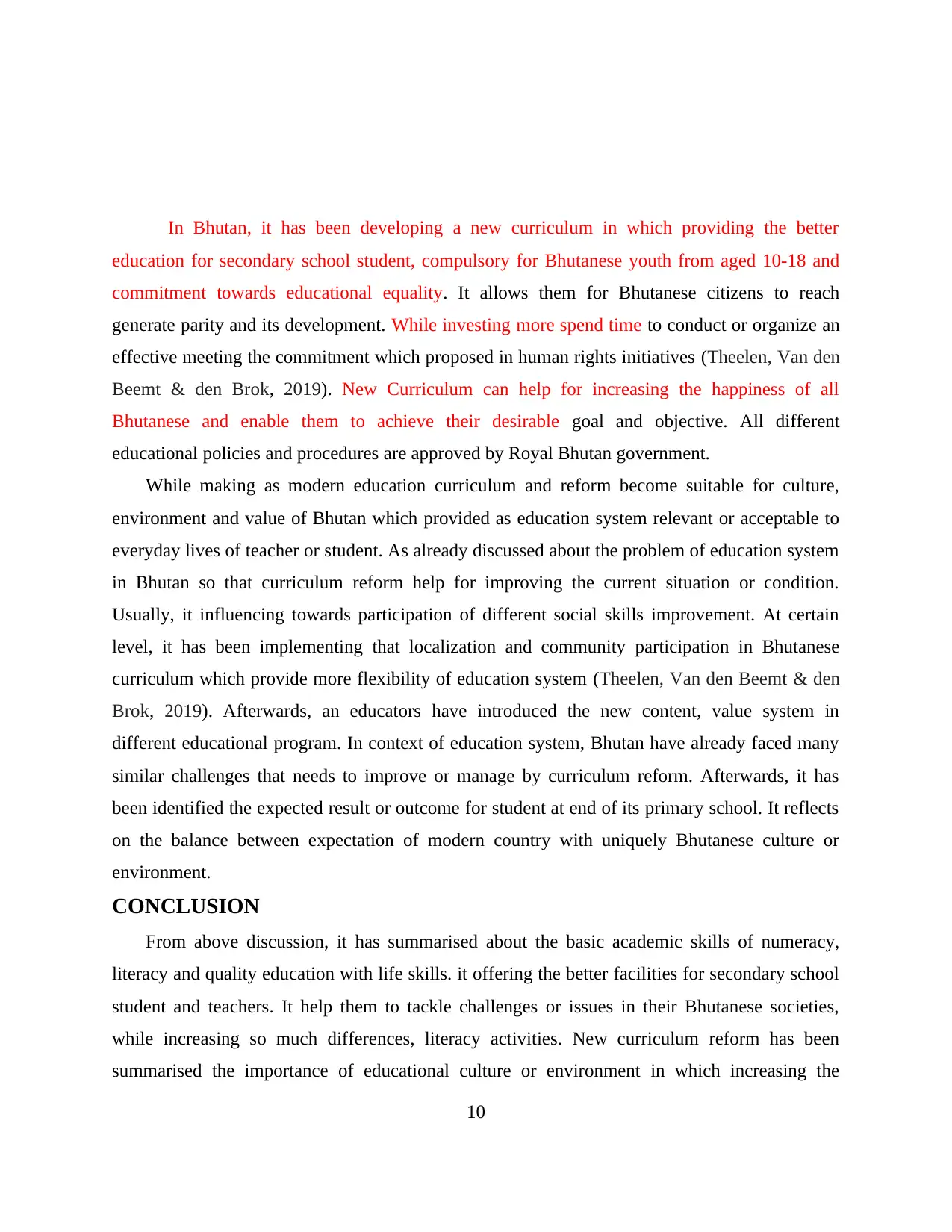
In Bhutan, it has been developing a new curriculum in which providing the better
education for secondary school student, compulsory for Bhutanese youth from aged 10-18 and
commitment towards educational equality. It allows them for Bhutanese citizens to reach
generate parity and its development. While investing more spend time to conduct or organize an
effective meeting the commitment which proposed in human rights initiatives (Theelen, Van den
Beemt & den Brok, 2019). New Curriculum can help for increasing the happiness of all
Bhutanese and enable them to achieve their desirable goal and objective. All different
educational policies and procedures are approved by Royal Bhutan government.
While making as modern education curriculum and reform become suitable for culture,
environment and value of Bhutan which provided as education system relevant or acceptable to
everyday lives of teacher or student. As already discussed about the problem of education system
in Bhutan so that curriculum reform help for improving the current situation or condition.
Usually, it influencing towards participation of different social skills improvement. At certain
level, it has been implementing that localization and community participation in Bhutanese
curriculum which provide more flexibility of education system (Theelen, Van den Beemt & den
Brok, 2019). Afterwards, an educators have introduced the new content, value system in
different educational program. In context of education system, Bhutan have already faced many
similar challenges that needs to improve or manage by curriculum reform. Afterwards, it has
been identified the expected result or outcome for student at end of its primary school. It reflects
on the balance between expectation of modern country with uniquely Bhutanese culture or
environment.
CONCLUSION
From above discussion, it has summarised about the basic academic skills of numeracy,
literacy and quality education with life skills. it offering the better facilities for secondary school
student and teachers. It help them to tackle challenges or issues in their Bhutanese societies,
while increasing so much differences, literacy activities. New curriculum reform has been
summarised the importance of educational culture or environment in which increasing the
10
education for secondary school student, compulsory for Bhutanese youth from aged 10-18 and
commitment towards educational equality. It allows them for Bhutanese citizens to reach
generate parity and its development. While investing more spend time to conduct or organize an
effective meeting the commitment which proposed in human rights initiatives (Theelen, Van den
Beemt & den Brok, 2019). New Curriculum can help for increasing the happiness of all
Bhutanese and enable them to achieve their desirable goal and objective. All different
educational policies and procedures are approved by Royal Bhutan government.
While making as modern education curriculum and reform become suitable for culture,
environment and value of Bhutan which provided as education system relevant or acceptable to
everyday lives of teacher or student. As already discussed about the problem of education system
in Bhutan so that curriculum reform help for improving the current situation or condition.
Usually, it influencing towards participation of different social skills improvement. At certain
level, it has been implementing that localization and community participation in Bhutanese
curriculum which provide more flexibility of education system (Theelen, Van den Beemt & den
Brok, 2019). Afterwards, an educators have introduced the new content, value system in
different educational program. In context of education system, Bhutan have already faced many
similar challenges that needs to improve or manage by curriculum reform. Afterwards, it has
been identified the expected result or outcome for student at end of its primary school. It reflects
on the balance between expectation of modern country with uniquely Bhutanese culture or
environment.
CONCLUSION
From above discussion, it has summarised about the basic academic skills of numeracy,
literacy and quality education with life skills. it offering the better facilities for secondary school
student and teachers. It help them to tackle challenges or issues in their Bhutanese societies,
while increasing so much differences, literacy activities. New curriculum reform has been
summarised the importance of educational culture or environment in which increasing the
10
Paraphrase This Document
Need a fresh take? Get an instant paraphrase of this document with our AI Paraphraser
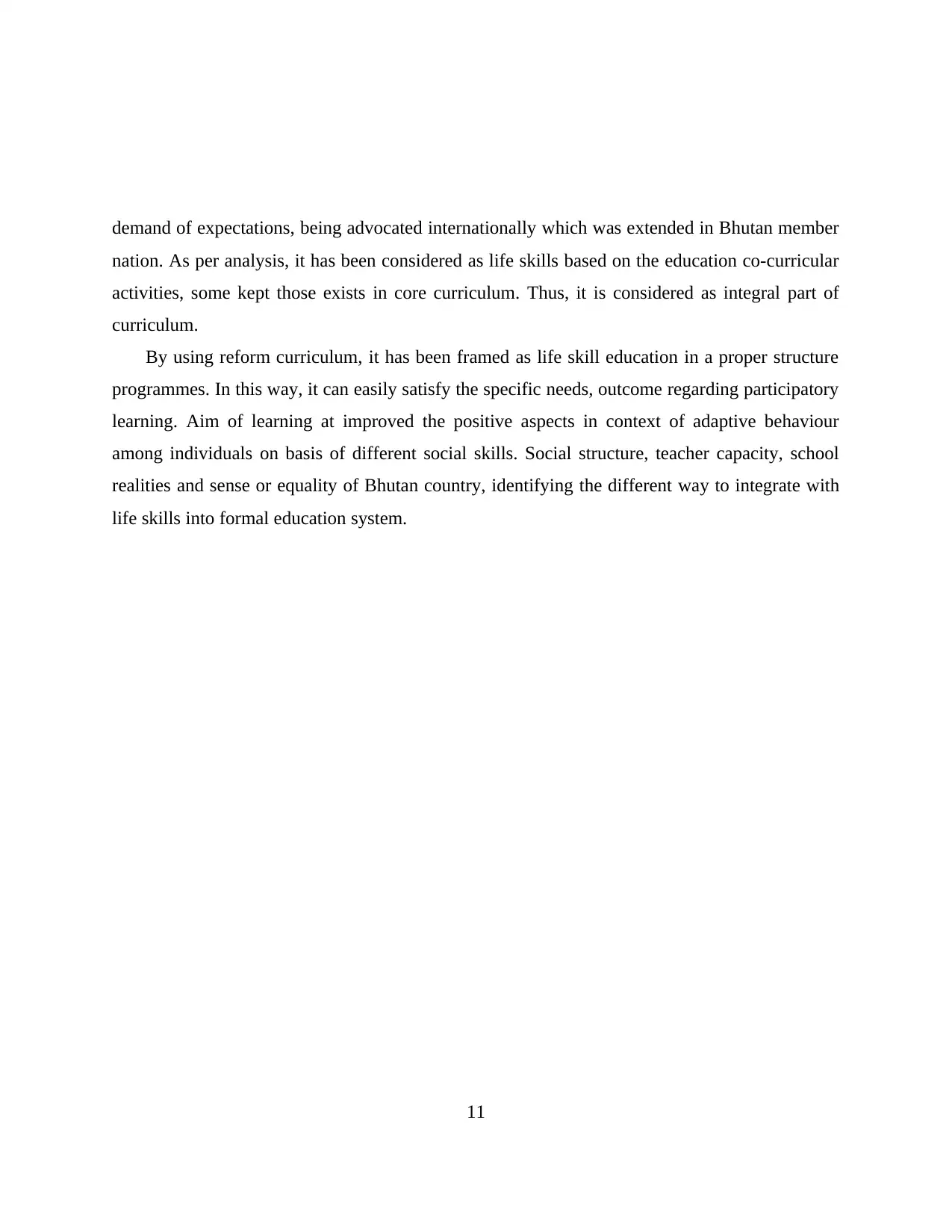
demand of expectations, being advocated internationally which was extended in Bhutan member
nation. As per analysis, it has been considered as life skills based on the education co-curricular
activities, some kept those exists in core curriculum. Thus, it is considered as integral part of
curriculum.
By using reform curriculum, it has been framed as life skill education in a proper structure
programmes. In this way, it can easily satisfy the specific needs, outcome regarding participatory
learning. Aim of learning at improved the positive aspects in context of adaptive behaviour
among individuals on basis of different social skills. Social structure, teacher capacity, school
realities and sense or equality of Bhutan country, identifying the different way to integrate with
life skills into formal education system.
11
nation. As per analysis, it has been considered as life skills based on the education co-curricular
activities, some kept those exists in core curriculum. Thus, it is considered as integral part of
curriculum.
By using reform curriculum, it has been framed as life skill education in a proper structure
programmes. In this way, it can easily satisfy the specific needs, outcome regarding participatory
learning. Aim of learning at improved the positive aspects in context of adaptive behaviour
among individuals on basis of different social skills. Social structure, teacher capacity, school
realities and sense or equality of Bhutan country, identifying the different way to integrate with
life skills into formal education system.
11
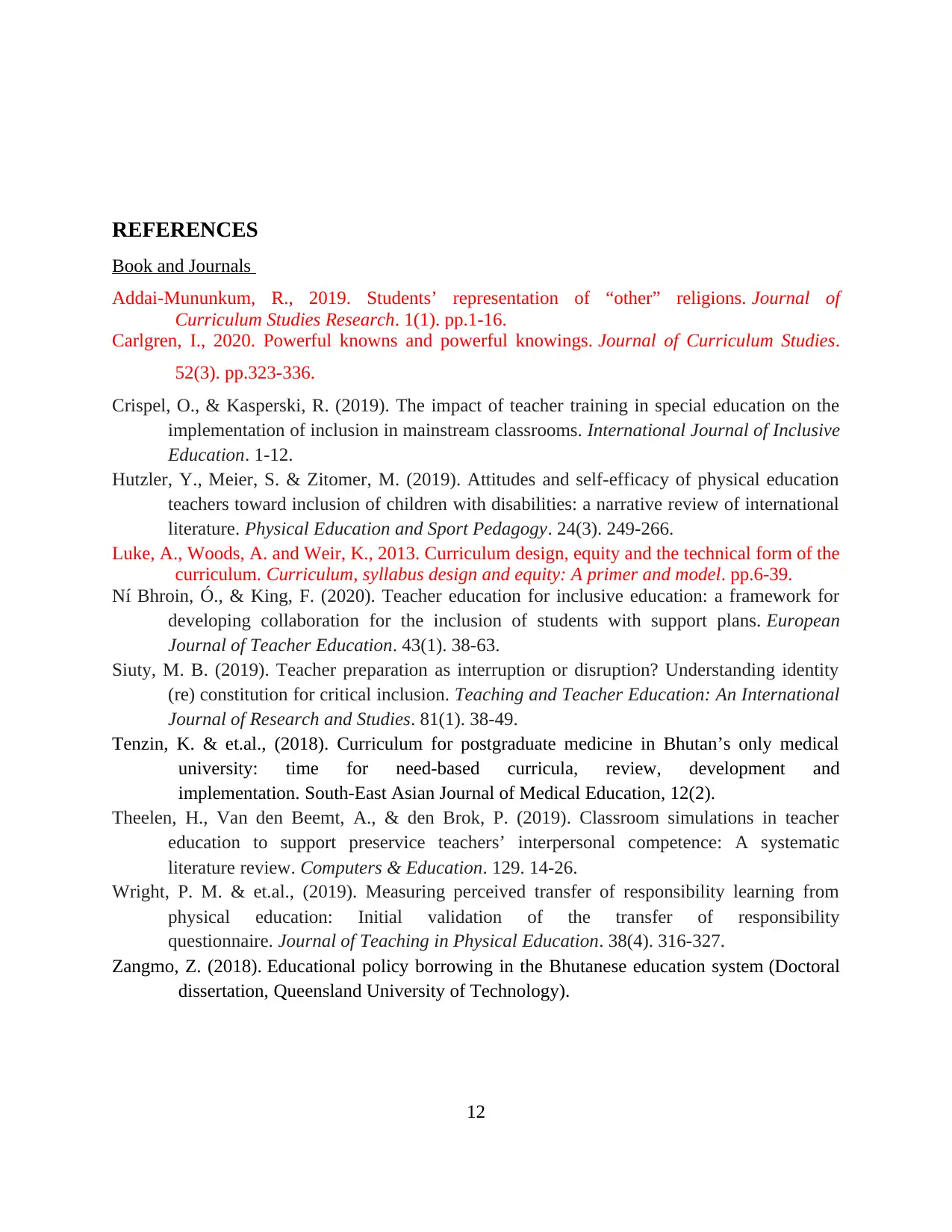
REFERENCES
Book and Journals
Addai-Mununkum, R., 2019. Students’ representation of “other” religions. Journal of
Curriculum Studies Research. 1(1). pp.1-16.
Carlgren, I., 2020. Powerful knowns and powerful knowings. Journal of Curriculum Studies.
52(3). pp.323-336.
Crispel, O., & Kasperski, R. (2019). The impact of teacher training in special education on the
implementation of inclusion in mainstream classrooms. International Journal of Inclusive
Education. 1-12.
Hutzler, Y., Meier, S. & Zitomer, M. (2019). Attitudes and self-efficacy of physical education
teachers toward inclusion of children with disabilities: a narrative review of international
literature. Physical Education and Sport Pedagogy. 24(3). 249-266.
Luke, A., Woods, A. and Weir, K., 2013. Curriculum design, equity and the technical form of the
curriculum. Curriculum, syllabus design and equity: A primer and model. pp.6-39.
Ní Bhroin, Ó., & King, F. (2020). Teacher education for inclusive education: a framework for
developing collaboration for the inclusion of students with support plans. European
Journal of Teacher Education. 43(1). 38-63.
Siuty, M. B. (2019). Teacher preparation as interruption or disruption? Understanding identity
(re) constitution for critical inclusion. Teaching and Teacher Education: An International
Journal of Research and Studies. 81(1). 38-49.
Tenzin, K. & et.al., (2018). Curriculum for postgraduate medicine in Bhutan’s only medical
university: time for need-based curricula, review, development and
implementation. South-East Asian Journal of Medical Education, 12(2).
Theelen, H., Van den Beemt, A., & den Brok, P. (2019). Classroom simulations in teacher
education to support preservice teachers’ interpersonal competence: A systematic
literature review. Computers & Education. 129. 14-26.
Wright, P. M. & et.al., (2019). Measuring perceived transfer of responsibility learning from
physical education: Initial validation of the transfer of responsibility
questionnaire. Journal of Teaching in Physical Education. 38(4). 316-327.
Zangmo, Z. (2018). Educational policy borrowing in the Bhutanese education system (Doctoral
dissertation, Queensland University of Technology).
12
Book and Journals
Addai-Mununkum, R., 2019. Students’ representation of “other” religions. Journal of
Curriculum Studies Research. 1(1). pp.1-16.
Carlgren, I., 2020. Powerful knowns and powerful knowings. Journal of Curriculum Studies.
52(3). pp.323-336.
Crispel, O., & Kasperski, R. (2019). The impact of teacher training in special education on the
implementation of inclusion in mainstream classrooms. International Journal of Inclusive
Education. 1-12.
Hutzler, Y., Meier, S. & Zitomer, M. (2019). Attitudes and self-efficacy of physical education
teachers toward inclusion of children with disabilities: a narrative review of international
literature. Physical Education and Sport Pedagogy. 24(3). 249-266.
Luke, A., Woods, A. and Weir, K., 2013. Curriculum design, equity and the technical form of the
curriculum. Curriculum, syllabus design and equity: A primer and model. pp.6-39.
Ní Bhroin, Ó., & King, F. (2020). Teacher education for inclusive education: a framework for
developing collaboration for the inclusion of students with support plans. European
Journal of Teacher Education. 43(1). 38-63.
Siuty, M. B. (2019). Teacher preparation as interruption or disruption? Understanding identity
(re) constitution for critical inclusion. Teaching and Teacher Education: An International
Journal of Research and Studies. 81(1). 38-49.
Tenzin, K. & et.al., (2018). Curriculum for postgraduate medicine in Bhutan’s only medical
university: time for need-based curricula, review, development and
implementation. South-East Asian Journal of Medical Education, 12(2).
Theelen, H., Van den Beemt, A., & den Brok, P. (2019). Classroom simulations in teacher
education to support preservice teachers’ interpersonal competence: A systematic
literature review. Computers & Education. 129. 14-26.
Wright, P. M. & et.al., (2019). Measuring perceived transfer of responsibility learning from
physical education: Initial validation of the transfer of responsibility
questionnaire. Journal of Teaching in Physical Education. 38(4). 316-327.
Zangmo, Z. (2018). Educational policy borrowing in the Bhutanese education system (Doctoral
dissertation, Queensland University of Technology).
12
⊘ This is a preview!⊘
Do you want full access?
Subscribe today to unlock all pages.

Trusted by 1+ million students worldwide
1 out of 13
Related Documents
Your All-in-One AI-Powered Toolkit for Academic Success.
+13062052269
info@desklib.com
Available 24*7 on WhatsApp / Email
![[object Object]](/_next/static/media/star-bottom.7253800d.svg)
Unlock your academic potential
Copyright © 2020–2026 A2Z Services. All Rights Reserved. Developed and managed by ZUCOL.





